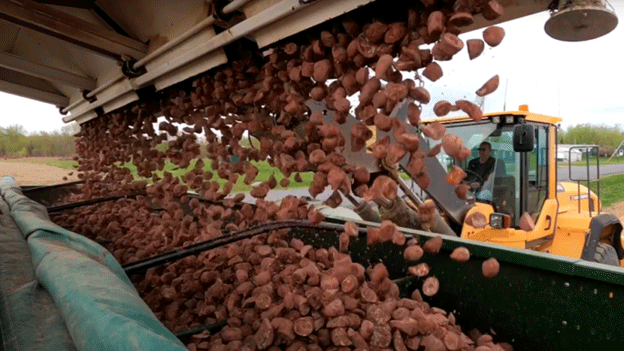Just nine years after its introduction, the Caribou Russet potato, developed by the University of Maine, is making significant waves in the agricultural world. It has become a standout variety, praised for both its field performance and culinary versatility. As of 2023, Caribou Russet is the most widely planted seed potato variety in Maine, according to industry publication Spudman. This success marks a considerable shift in a state where traditional varieties like the Russet Burbank have long been dominant.
A Versatile and Resilient Potato
Caribou Russet’s rise to prominence is due to several key advantages. The potato, characterized by its elongated shape, reddish-brown skin, and white flesh, is lauded for its adaptability in the kitchen—it is ideal for mashing, frying, or baking. More importantly for farmers, the variety boasts a high yield and notable resistance to common potato diseases, such as hollow heart and verticillium wilt. This combination makes it attractive for both commercial growers and consumers.
Jim Gerritsen, a veteran organic potato farmer from Wood Prairie Farm in Bridgewater, has seen the impact firsthand. “It’s one of the most significant varieties in the last 20 years,” he remarked. Caribou Russet now accounts for around 10% of the farm’s seed potato sales. Other farmers echo this sentiment. Noah Winslow, Head of Marketing and Quality Assurance at Irving Farms, emphasized the appeal of Caribou Russet: “It meets many needs—high yield, a relatively short growing season, and versatility for both processors and consumers.”
Maine’s Steady but Competitive Potato Market
Potato production in Maine has remained relatively stable over the past two decades, increasing by just 1% from 2000 to 2022. Yet, Maine stands out as one of the few states, along with Texas and Michigan, to have seen any growth in this period. Nationally, Texas experienced a 38% increase in potato production, while Michigan’s rose by 10%. Conversely, California faced a dramatic decline, with production halving over the same period.
Despite these fluctuations, Maine still ranks among the top potato-producing states in the U.S., with Aroostook County leading the charge. In 2022, Aroostook was the third-largest potato-producing county in the nation, highlighting the crop’s importance to the local economy. Over 80% of Maine’s vegetable-growing land is dedicated to potatoes, demonstrating the crop’s central role in the state’s agriculture.
The Challenge of Storage and Market Viability
While Caribou Russet offers numerous advantages, it does come with some challenges. One of the main concerns is its storage life compared to older varieties like Russet Burbank, which can be stored until the following August. Caribou Russet, in contrast, remains viable until around March, after which it starts sprouting. Greg Porter, the lead developer of Caribou Russet who recently retired from the University of Maine, explained that the variety’s shorter dormancy period can complicate storage and market logistics.
Barry Campbell, a longtime potato grower in Littleton, takes a pragmatic view. “If you’re aware of the shorter storage period, you can manage it,” he said, indicating that the issue is surmountable with proper planning. This perspective is echoed by Winslow, who noted that premature spoilage issues observed in spring 2023 affected multiple potato varieties, not just Caribou Russet.
A Long Journey of Innovation
Developing a new potato variety is no small feat. According to Porter, the process can take between 12 and 15 years from initial cross-pollination to commercial release. The University of Maine tests over 250 potato crosses annually, beginning in the greenhouse and advancing to large-scale field trials in Presque Isle. The rigorous testing ensures that only the most promising varieties reach the market. However, even then, commercial success is never guaranteed. Porter recalled the Easton variety, developed alongside Caribou Russet, which failed to make a commercial impact due to storage issues, despite its initial promise.
Caribou Russet’s rapid rise reflects both its strengths and the evolving needs of Maine’s potato industry. It has shown that new, well-bred varieties can compete with century-old staples, provided they address modern agricultural and market demands. Yet, like all agricultural advancements, Caribou Russet must adapt to the realities of large-scale farming, including overcoming challenges like storage duration. As farmers, agronomists, and scientists continue to collaborate, Caribou Russet stands as a testament to the potential of innovation in crop breeding.







